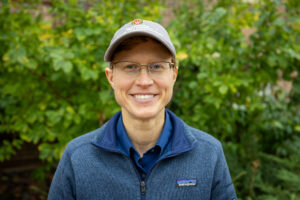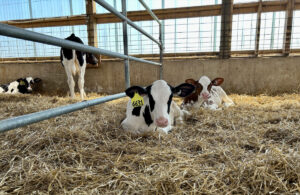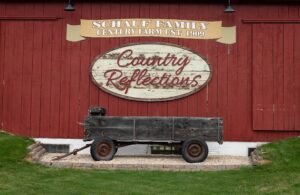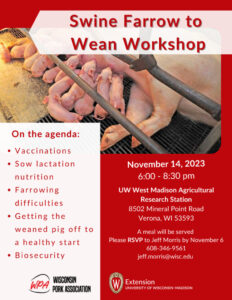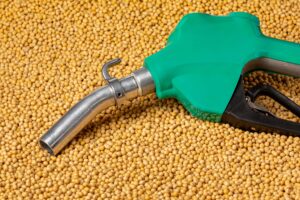UW Professor Honored For Crop Breeding Work
Julie Dawson, an associate professor and extension specialist in the UW–Madison Department of Plant and Agroecosystem Sciences, was recently named the Clif Bar and Organic Valley Chair in Plant Breeding for Organic Agriculture. The appointment runs from July 1, 2023, to June 30, 2030.
Dawson’s plant breeding efforts concentrate on crops that meet specific regional needs. She involves hundreds of farmers and also home gardeners in trials through which they offer feedback on crop varieties. Recent work includes tomatoes adapted to organic high-tunnel systems and bread wheat for artisanal baking. She also has done work with American hazelnut which has the potential to be a high-value crop for organic growers. In addition to farmers, Dawson’s partners include SeedLinked, the Organic Seed Alliance, the Artisan Grain Collaborative, UW associate professor Lucia Gutierrez, the Upper Midwest Hazelnut Development Initiative, the Savanna Institute and many plant breeding colleagues.
Through the Seed to Kitchen Collaborative Dawson coordinates a large network of plant breeders, seed producers, farmers, chefs and local food consumers. This network helps independent vegetable breeders and small regional seed companies evaluate, improve and release varieties adapted to organic systems.
“It is great to see Professor Dawson in this position,” says Adam Warthesen, of Organic Valley. The research in organic plant breeding is needed today as much as it was when this chair was first created. We just had Julie on an organic dairy farm this summer. She knows this community. Her work on small grains is something farmers in our co-op identify with. We look forward to collaborating with Professor Dawson and the entire UW CALS team.”
Teaching the next generation of organic plant breeders is another major element of Dawson’s program. She also helped develop an organic agriculture certificate for undergraduate students at UW–Madison with the UW Organic Collaborative. Dawson also created a registered apprenticeship program for organic vegetable farm managers with the FairShare Coalition and Wisconsin’s Department of Workforce Development.
Dawson is involved in public service at the national level. She is the lead author on a 2023 USDA–Agricultural Marketing Service report. This covers intellectual property rights and competition in the seed industry. She is now working with the USDA to begin implementing some of the report’s recommendations.
Managing Calf Health
Fall weather can really throw us for a loop with high temperatures one day and then a foot of snow the next. This means you’ve got to keep an eye on your livestock barns and your herd health.
The Dairyland Initiative in the School of Veterinary Medicine is an online resource for dairy farmers and industry consultants that need more information about animal housing, lameness prevention and calf health.
They will be hosting a virtual workshop December 13-14 that will cover topics that are essential for a successful calf rearing program. The workshop will include speakers from the University of Wisconsin School of Veterinary Medicine and the Department of Animal and Dairy Sciences.
Dr. Terri Ollivett will take a deep dive into respiratory disease. She will teach participants how to troubleshoot calf health following her #WeanClean philosophy. She will also cover major calf topics such as maternity and colostrum management, feeding rates and strategies, biosecurity, and hygiene.
Also covered will be best practices to promote welfare in calves raised in pairs or small groups. Dr. Jennifer Van Os will share guidelines to help you determine if you’re ready to move away from individual housing.
Dr. Jimena Laporta will present the latest research on solutions to mitigate heat stress in calves.
With proper calf health comes proper housing. Courtney Halbach will cover the importance of building barns to maximize ventilation and provide calves with a comfortable place to rest while Dr. Nigel Cook will discuss the latest in housing recommendations for growing heifers.
Those interested in the workshop should register by noon on Dec. 12 at https://bit.ly/decworkshop2023.
Hear From Wisconsin’s Sesquicentennial Farms
In Sauk County, the Meyer family has traced their origins back to 1866 as they celebrate their sesquicentennial milestone. Love letters written between Don Meyer’s great grandfather and great grandmother help paint the story that continues today. After finally tying the knot in 1868, the couple purchased their first 75 acres in 1870.
This is just a snippet of Wisconsin’s farm family histories. Meyer is among roughly 100 farms to accept the 2023 Sesquicentennial Farm & Home Award from the state.
Mid-West Farm Report has a collection of these stories that we’re sharing with you courtesy of Compeer Financial. You can find our conversations with both Century and Sesquicentennial awardees here: https://www.midwestfarmreport.com/wisconsin-century-sesquicentennial-farm-salute-2023/
The state’s Century Farm Program honors about 100 properties each year. There have been more than 9,600 properties honored since the program began in 1948. The Sesquicentennial Farm & Home Award has honored more than 940 farms since 1998.
Meyer tells Mid-West Farm Report in an interview that they’ve pieced together that the early farm was pretty diverse with a variety of animals and crops, including hops. In 1896 the couple bought 20 more acres of woodland from the neighbors for $300, and continued expanding from that time forward.
Today the Meyer farm lives on and looks forward to sharing the history with the next generation.
In Dodge County, we hear from Bobbi Pruski, who tells the story of her family’s 150-year-old farm that began in 1873. They raised dairy cattle, hogs, and chickens. Over the years, the farm passed from father to son for many generations. The original barn is still on the farmstead today where Tony Schumacher now runs the operation.
Schumacher milks about 50 cows in a stanchion barn and has begun bridging out to offer custom field work. The family fondly looks back on 2016, when the farm hosted the Dodge County Dairy Breakfast.
In Green County, we come across a 267-acre farm that belongs to Rosemary Simonson’s family. Rosie is the fifth generation on her family’s Sesquicentennial Farm called The Delbert Lynch Family Farm Trust just three miles south of Browntown. She recalls fond memories of family gatherings, vegetable soup, and making maple syrup. She also remembers not-so-fun experiences like butchering chickens!
Maybe you share similar memories of growing up on the farm!
These are just three of many historical farm stories — some of these families rooted in Wisconsin since the state first began. Find more by clicking on the 2023 Wisconsin Century & Sesquicentennial Farm Salute tab: https://www.midwestfarmreport.com/wisconsin-century-sesquicentennial-farm-salute-2023/
Dairy Processors Expand, But Farmers Are Hesitant
Ever.Ag Broker Analyst Cody Koster joins Farm Director Pam Jahnke with an update on the dairy processing side of the industry. He says there are dairy plants under construction in the northeast, central and southwest corners of the U.S., but they’re not necessarily finding a lot of supportive dairy producers ready to grow with them.
“What we’re hearing through the grapevine is it’s hard to have those companies get producers to build new dairies for these processing plants especially with interest rates at 8 to 8.5 percent,” he says. “It’s just hard to make that dollar back.”
Business models usually call for growth, not contraction. That’s why dairy processors are still thinking about expanding capacity, even in a challenging economic climate. Dairy farmers though, are currently acting much more conservative than their processing partners like. Koster says that’s why processors are rethinking their business models.
“I think they’re taking a different look at the investors,” he says. “We still hear that these plants are being built. Even in the mid-East and Midwest, there’s still a little bit of expansion going like on the butter side.”
Meanwhile, producers are not look at expanding the herd, but rather improving what they already have at home. Even if lower milk prices and high interest rates aren’t deterring dairies, heifer prices might. Replacement heifers come with an escalating cost, Koster says. High beef prices have thinned the dairy/beef selection, and dairies that do have available heifers that could enter your milking herd are asking a pretty penny for the animal.
“One guy was quoting $2,600 for spring heifers, and he had mentioned there might be a little bit of a waiting list on that,” he says. “The heifer is going to be the way to go to rebound the herd, but it’s going to come at a cost.”
Wisconsinite Named National FFA Proficiency Winner
Brooke Casey of the New London FFA Chapter is the 2023 National FFA Agricultural Proficiency Award winner in the Veterinary Science – Entrepreneurship/Placement category.
Casey works as a veterinary assistant at her local clinic and has also shadowed a large animal veterinarian at another operation. As an assistant, she works with vets to do checkups on healthy animals and exams on sick pets. She also works with the surgery and dental patients. She draws blood, gives vaccines, takes radiographs, assists with ultrasounds and more. Casey is supported by her parents, Bette and Glenn, and her FFA advisor, Crystal Retzlaff.
Agricultural proficiency awards honor FFA members who, through supervised agricultural experiences (SAEs), have developed specialized skills that they can apply toward their future careers. Students compete in areas ranging from agricultural communications to wildlife management. Proficiency awards are also recognized at local and state levels and provide recognition to members exploring and becoming established in agricultural career pathways
WATA Asks Senate To Remove ‘Wedding Barn’ Provisions
If you’re in Wisconsin, you’ve probably heard of a wedding barn or event barn. These are barns on private land that a farmer rents out to a private event, such as a wedding or a family reunion.
Wedding barns have been legally operating in Wisconsin for over 40 years, according to the Wisconsin Agricultural Tourism Association.
However, there are a few bills circulating the state Senate that could change how these farmers operate their event barns, and WATA says it’s a problem. The association is opposing provisions in SB 332 that would add more stringent rules for agriculture venues. It would require farmers to have liquor licenses — which may require special zoning — or else get a permit that would only allow six events a year.
Greg Schauf of Country Reflections in Sparta tells Mid-West Farm Report it this would classify private land as a public space and take away his ability to keep his Century Farm economically viable.
“I have dedicated my life to this farm,” he says. “My desire is to preserve our family’s heritage along with the rural integrity of the land. Creating a new purpose for this farm helps give me the opportunity to do that.”
WATA is asking the Senate to remove all venue language from the bill, and then move the bill forward. The association supports the rest of the language in the bill that would allow wineries to stay open until midnight, brew pubs to operate stand-alone retail stores, and add a new statewide bartender license.
Swine Producers Workshop Focuses on Farrow to Wean
The University of Wisconsin -Extension is hosting a Farrow to Wean Workshop for swine producers on November 14 at the UW Research Station in Verona.
The workshop will help participants in learn about sow nutrition during the lactation phase, vaccinations for the newborn pig, handling farrowing difficulties, and biosecurity on swine farms. Participants will learn from UW-Madison Extension staff Jeff Morris, Emma Wedig with Zoetis, Dietrich Johnson with Hueber Feeds, and veterinarian staff from Military Ridge Vet Clinic. Presenters will engage participants through lectures and discussion of this critical production phase.
A meal will be provided by the Wisconsin Pork Association. There is no charge for this informative event. Interested participants can RSVP to Jeff Morris at jeff.morris@wisc.edu or 608-3469561 by November 9, 2023.
CentralStar Members Honored
CentralStar Cooperative recently honored team members for a wide range of accomplishments. These include work anniversaries, sales achievements, exemplary service, as well as outstanding efforts in their respective roles.
A.I Specialist Awards
Garret Carnahan, Hilbert, Wis.; Jeremy Konen, Mazomanie, Wis.; and Becky Spatz, Kewaskum, Wis., all received A.I. Specialist of the Year awards. Nathan Ellerbrock, Osseo, Wis., was named Team A.I. Technician of the Year. Zach Zernicke, Marinette, Wis., was Runner-Up Team A.I. Technician of the Year. Carla Stetzer, Alma Center, Wis., was awarded Consultant of the Year. Dave Lindberg, Mayville, Mich., was honored with Area Sales Manager of the Year.
DHI Milk-Testing Awards
Continuing with CentralStar’s DHI-milk-testing business unit, DHI Specialist of the Year recognition went to three individuals: Jayne Steuer-Birkholz, Elkhart Lake, Wis.; Autumn Martin, Rives Junction, Mich.; and also Shellie Volker, Sumner, Iowa. First-Year DHI Specialist of the Year recipients include Kyle Peissig, Edgar, Wis.; Rachel Donlin, Hull, Iowa; and Rachel Keuning, Avoca, Mich.
Team Star-Member Awards
Employee team members are asked to vote for Team Star-Member Award winners who exemplify teamwork, dedication to customers, and overall enthusiasm for the company. Team Star-Member Award winners include Lisa Loos, Appleton, Wis.; Scott Malueg, Black Creek, Wis.; Doug Lehman, Spencer, Wis.; Vanessa Ponterio, Fond du Lac, Wis.; Arianna Vantine, Durand, Mich.; John Wasson, Okemos, Mich., Leroy Gingerich, Kolona, Iowa; Harvey Stieve; Charley Bogart, Sumner, Mich.; Tim Schmidt, Warren, Ind.; and also Pam Thom, Peck, Mich.
A.I. Services Awards
CentralStar recognizes A.I. specialists and team A.I. technicians for number of A.I. services. Achieving the 100,000 A.I.-service milestone during the last fiscal year were Mark Wallace, Wild Rose, Wis.; Joel Franke, Hillsboro, Wis.; Tim Trones, Mondovi, Wis.; and Mohammed Touir, Madison, Wis. Steve Otteson, Arlington, Wis. achieved the 150,000 milestone. Achieving the 200,000 A.I.-service milestone were Eric Gudex, Oakfield, Wis.; Jason Ossmann, Greenleaf, Wis.; and Duane Nowak, Medford, Wis.
DHI Testing Awards
In CentralStar’s DHI business unit, employees are honored for number of cows tested. Major milestones in this area include those who’ve tested 1 million cows so far in their careers: Kaitlyn Dillenburg, Shawano, Wis.; Christine Riehle, Edgar, Wis., and Kris Kimball, Seymour, Wis. In addition, Danielle Schlueter, Hortonville, Wis., and David Kohn, Medford, Wis., were honored for testing 2 million cows. Roger Sweeney, Ubly, Mich. was recognized for testing 4 million cows. Jayne Steuer-Birkholz was recognized for testing 5 million cows. Rick Huth, Green Bay, Wis. achieved testing 8 million cows.
Member Service Awards
CentralStar Cooperative has tremendous longevity among employee team members, and several were honored for major levels in years of service. Those with the most tenure include Deb Giese, Waupun, Wis., as well as Michelle Haarer, Lansing, Mich. with 25 years. Celebrating 30 years were Dan Zernicke, Bonduel, Wis.; Darlene Cipcich, Bonfield, Ill.; Ed Nichols, Lansing, Mich.; and Bob Radke, Banger, Wis. Several employee team members also hit the 35-year mark. They include John Wasson; Scott Ellevold, Emerald, Wis.; and Steve Otteson. Rounding out the work-anniversary milestones at 40 years with the cooperative were Harvey Kuehn, Green Bay, Wis.; Harvey Stieve; and Mark Rude, Ridgeland, Wis.
Spiegel The Poultry Supreme Exhibitor
Jada Spiegel of Seymour, is the Wisconsin State Fair Poultry Supreme Exhibitor. The Supreme Exhibitor award is based on a junior exhibitor’s overall achievements at the 2023 Fair from points earned participating in the Junior Poultry show, Quiz contest, Communication contest and Showmanship.
Spiegel has exhibited at Wisconsin State Fair for the past five years. She is a college freshman that has participated in both the junior and open poultry shows at Wisconsin State Fair. Spiegel currently attends UW-River Falls where she is majoring in crop science with the hopes of pursuing a master’s degree in plant breeding and genetics at UW-Madison.
When asked about her favorite memory, Spiegel stated that her favorite memory was when she stayed in the Tommy Thompson building one year. Her and her brother watched the draft horses exercise long before the Fair crowds arrived. “It was like a private parade just for us.”
Updating Greenhouse Gas Modeling For Renewable Fuels
Biofuels Caucus Co-chairs Dusty Johnson (R-S.D.) Adrian Smith (R-NE), Angie Craig (D-MN), and Mark Pocan (D-WI) introduced the Adopt Greenhouse Gases, Regulated Emissions, and Energy Use in Transportation (GREET) Act. The GREET Act will direct the Environmental Protection Agency (EPA) to update its greenhouse gas modeling for renewable fuels.
The Adopt GREET Act would require the EPA to adopt the Argonne National Lab’s GREET Model for renewable fuels. EPA would then be required to update its modeling every five years. If there is no update, the EPA must report to Congress and affirm its modeling is current.
“The EPA’s current greenhouse gas modeling is limiting adoption of homegrown renewable fuels,” said Rep. Johnson. “We should be using the best science available and that’s exactly what this bill does.”
“Agencies must use up-to-date, scientifically accurate modeling to ensure we keep pace with the latest technologies and innovations,” said Rep. Smith. “Not only does the model reinforce the positive contributions of American farmers and ranchers, it also makes agriculture products and byproducts more competitive exports.”
“Homegrown biofuels are tools we have at our fingertips right now to help address climate change – and it’s critically important that the EPA’s data accurately reflects that,” said Rep. Craig.
“This bipartisan bill will help our country harness the power of innovation and science to drive cleaner, more efficient transportation solutions,” said Rep. Pocan.

